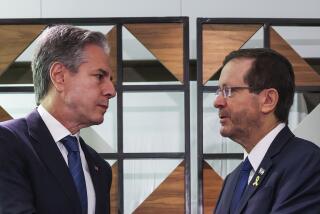Knesset Backs Peres’ Formula for Peace Talks
JERUSALEM — The Israeli Parliament, capping a long and often heated debate, Monday endorsed Prime Minister Shimon Peres’ controversial peace proposals and defeated a no-confidence motion brought by an opposition leader who charged that Peres had met secretly with Jordan’s King Hussein.
With 32 members either absent or abstaining, the Knesset voted 68 to 10 to support the seven-point peace plan that Peres unveiled last week in a speech to the United Nations. Eighty-six members voted against and six members for the no-confidence motion, brought by the ultranationalist Tehiya Party.
Deepening the Rift
Although the votes represented a significant victory for Peres, who spurned demands that he modify his peace proposals, the outcome deepened the already enormous rift between Peres’ Labor Alignment and the Likud Bloc in Israel’s 14-month-old “national unity” government.
When Deputy Prime Minister David Levy, a hard-line Likud member, continued to demand after the vote that Peres “clarify” his peace plan, the prime minister refused and demanded an apology from Levy for criticizing him while he was still in the United States.
“There is no room for clarifications. There is room only for an apology over the way I was attacked (while) abroad,” Peres said.
Levy and other hard-line Likud members, including Trade Minister Ariel Sharon, have accused Peres of violating the agreements upon which the Labor-Likud coalition was formed by offering specific concessions to Jordan in his U.N. speech.
Peres denied that he had overstepped the coalition guidelines, which pledged that the government would reject any peace moves that do not conform with the 1978 Camp David accords. However, he also refused Likud’s demands to state explicitly in his Knesset speech that the proposals he announced at the United Nations do not go beyond the Camp David framework.
“I stand behind every word I said at the United Nations,” said Peres, who then repeated the seven proposals, word for word, and asked the Knesset to approve them.
Maintaining that recent events have created a new and “dynamic situation” that opens “new horizons” for the peace process, Peres repeated his offer to enter into “quick, direct and honorable discussions” with Jordan in order to “guarantee a fair peace between our people.”
Praise for Hussein
Praising King Hussein as a leader who has chosen the path of “negotiations over traditional polemics,” Peres called on the Jordanian monarch to “continue working together” with Israel “in order not to miss the opportunity that has been created” for peace.
The prime minister’s use of the word continue intrigued analysts, in view of the persistent rumors that Peres and Hussein may have held a secret meeting recently in Paris.
Tehiya Party leader Geula Cohen, who introduced the no-confidence motion, charged that Peres and Hussein met clandestinely and accused Peres of conducting secret negotiations without the government’s consent. Peres has neither confirmed nor denied the rumors that he met with Hussein, although he acknowledged in an interview Sunday that “secret diplomacy” was taking place.
Peres’ U.N. speech provoked an uproar within the Likud Bloc, which saw it as deviating from the coalition’s guidelines for peace negotiations on several counts.
An International Forum
Likud members within the Cabinet were particularly upset over Peres’ suggestion that Israel might discuss territorial concessions in peace talks with Jordan and by his offer to conduct negotiations in an “international forum.” They were further upset by Peres’ failure to explicitly rule out negotiations with the Palestine Liberation Organization--although his subsequent remarks, both in interviews and in his Knesset speech, appeared to have done this.
While Peres, in his U.N. speech, said only that Palestinian negotiators in any future talks with Israel must “represent peace, not terror,” he told the Knesset that this “automatically excludes” the PLO. He said it is impossible to overlook the PLO’s history of “systematic terrorism (going back) tens of years.”
Peres’ references to the PLO, which represented his only attempt to clarify his U.N. speech, appeared to rule out what Likud members had seen as a suggestion that Israel might be willing to negotiate with the PLO if it renounces violence and recognizes Israel’s right to exist.
One Demand Unsatisfied
However, Peres refused to satisfy another Likud demand to rule out any form of international participation in future peace talks.
While Peres said that “no international forum” could be a substitute for direct Israeli-Jordanian negotiations, he suggested that the Security Council could sponsor the opening session of an international peace conference, after which it would step aside to allow direct negotiations to begin.
“I don’t propose an international conference in place of direct negotiations. The Russians, Americans and Chinese will not negotiate in place of us,” Peres said in his closing remarks to the Knesset. “But if an international conference is proposed with conditions acceptable to us, we will go.”
The Associated Press reported that Peres averted a government crisis during a morning meeting with Foreign Minister Yitzhak Shamir, Likud’s leader. Shamir’s political aide, Yossi Ahimeir, said the foreign minister had read Peres’ Knesset speech in advance and urged him to clarify the exclusion of the PLO from peace talks and to emphasize that no international forum could replace direct peace talks.
1 From Likud, 5 From Tehiya
As a result, only one member of the Likud Bloc, Knesset member David Magen, voted against the government in the no-confidence motion. The other five votes all came from the Tehiya Party.
Jordan, which feels that it cannot negotiate with Israel without the support of other Arab states, has ruled out negotiations unless they are conducted within the framework of an international peace conference sponsored by the five permanent members of the U.N. Security Council.
More to Read
Sign up for Essential California
The most important California stories and recommendations in your inbox every morning.
You may occasionally receive promotional content from the Los Angeles Times.










